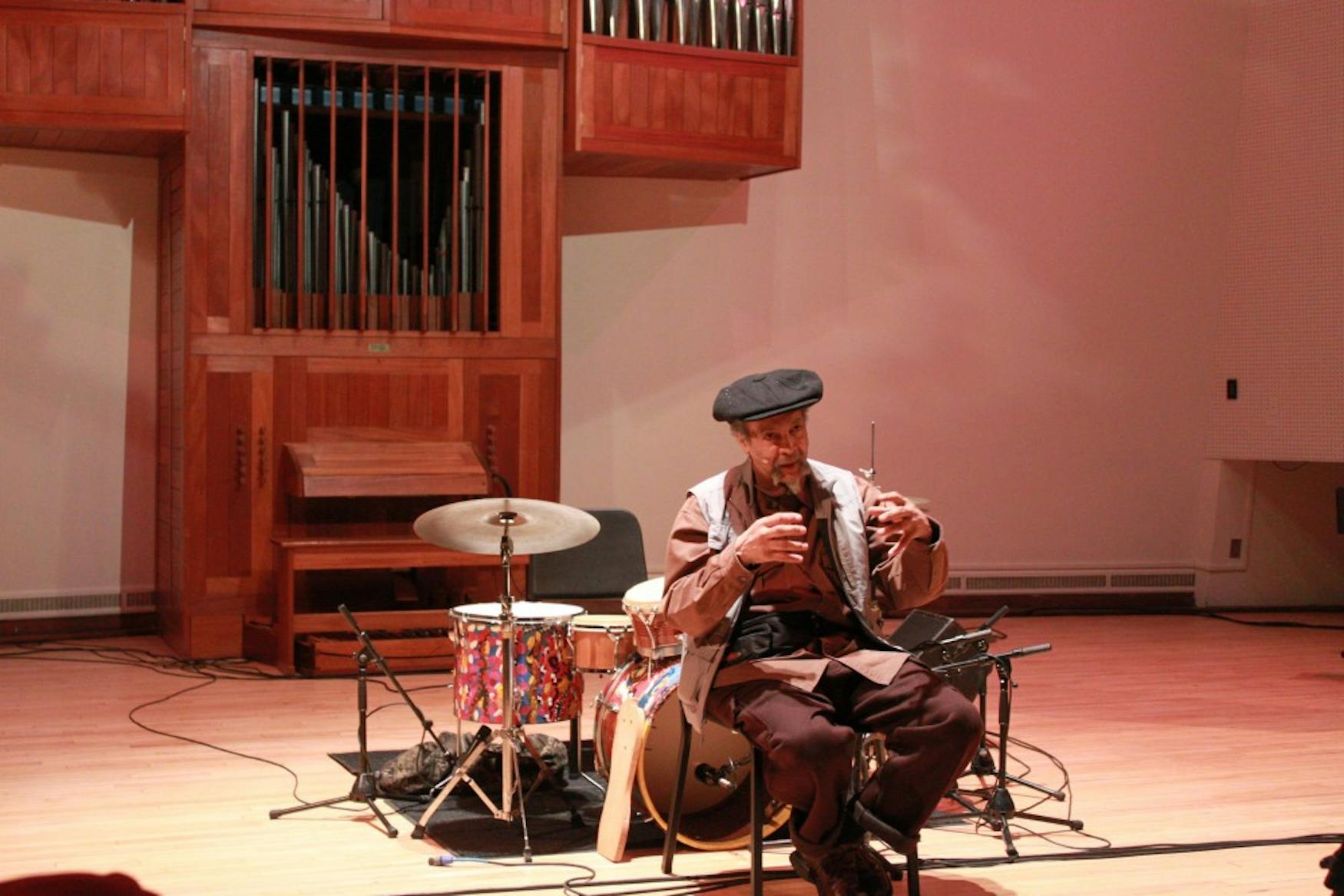Milford Graves delivers keynote address for first ever Brandeis Improv Festival
As part of the 2015 Brandeis Improv Festival, Milford Graves joined a small group of fellow musicians and other attendees to speak about his experiences with musical improvisation, drumming and healing through music. The keynote address was held last Saturday afternoon in the Slosberg Recital Hall. Graves’ eclectic storytelling style illuminated the hall and captured the attention of the audience.
Artistic Director Prof. Tom Hall (MUS) introduced Graves, citing when he met Graves for the first time at a different improv event, and thought Graves would be the perfect headliner for Brandeis’ festival. Hall explained that Graves’ adventurous and open perspective on improv perfectly captured the essence of the festival.
Graves began his talk by asking the audience what they wanted to hear about—taking a different approach from your standard keynote address of a prepared topic with a prepared theme or message. Instead, Graves’ speech can only be described as an interesting web of stories and lessons from his life and work. Graves is clearly passionate about his work, which ranges from his work in healing to 39 years as a professor at Bennington College.
As he asked for questions from the audience, Graves also gave context to the oversized applejack hat he was wearing. Years ago, Graves saw jazz artist Max Roach wearing a similar hat and decided he needed one as well—a similar reflection of Graves’ own mixture of skills and experiences gained in his life.
The first audience member asked about the connection between healing and rhythm, for which Graves is known. Graves explained that he was influenced by specific movies, including Tarzan, when he was around 10 years old. He and his friends would go into the woods near their neighborhood in Queens and imitate drum sounds, implanting the idea in his head that drumming and music were more than entertainment. Rather, they were a way to organize and unite people.
As for healing, Graves was influenced by a student he met while teaching at Bennington. The student went to medical school and kept in touch with Graves, inspiring him to study the frequency and pitch of heart sounds. In continuing his study of heartbeats, Graves believes that the pitch of a heartbeat can reveal medical conditions and offers a new way to understand and treat patients. Graves also explained the close connection between one’s emotional state and heart rhythm, citing a story about a student he demonstrated on while teaching a class at Bennington. Graves was listening to the student’s heartbeat, and when he asked how the student was feeling, the student’s heart rate rapidly increased out of fear. Graves continued his story, adding that his theory relates back to ideas about ancient spirits in Africa: healers who would enter possession states with drumming in the background.
Continuing with stories about his time at Bennington, Graves shared his thoughts on what musicians should study in order to provide the most for their audience. He believes that musicians have a responsibility to the audience and that the purpose of playing music is for other people. Modern musicians have become more like machines, instead of really connecting with people and understanding how they feel. Graves compared the need to be adaptable as an improv musician to a chef in needing to adjust to the demands of picky eaters or those with dietary restraints. One very Brandeisian example took place at an upstate New York Jewish function Graves and his band played at where they say they were asked to leave for not playing “Jewish” enough music.
Several of Graves’ former Bennington students attended at the address, and they provided different perspectives and interesting answers to some audience questions. It’s clear that Graves’ dynamic and inviting teaching style from his 39 years at the college influenced his students and left its mark. Graves described his teaching style as homeopathic and not fearing to go outside the box while being open to world culture. Around the age of 18, Graves told the audience how he bought records of world music to teach himself about different cultures. Years later in 1988, Graves performed with a Japanese band in Okinawa. He explained that his appreciation and acceptance of other cultures allowed him to play along with a very different musical style.
Toward the end of his talk, Graves revealed to the audience that he doesn’t want to get old and stop wanting to elevate himself and his jazz music. His time at Bennington, which he actually joined hesitantly, kept him young while also spreading his love of music to younger generations.



Please note All comments are eligible for publication in The Justice.